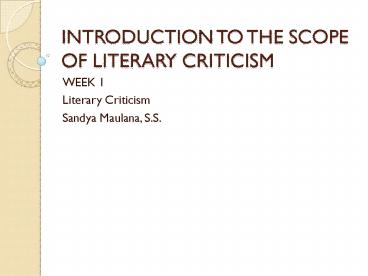INTRODUCTION TO THE SCOPE OF LITERARY CRITICISM - PowerPoint PPT Presentation
Title:
INTRODUCTION TO THE SCOPE OF LITERARY CRITICISM
Description:
INTRODUCTION TO THE SCOPE OF LITERARY CRITICISM WEEK 1 Literary Criticism Sandya Maulana, S.S. INTRODUCTION TO THE SCOPE OF LITERARY CRITICISM First of all, the main ... – PowerPoint PPT presentation
Number of Views:154
Avg rating:3.0/5.0
Title: INTRODUCTION TO THE SCOPE OF LITERARY CRITICISM
1
INTRODUCTION TO THE SCOPE OF LITERARY CRITICISM
- WEEK 1
- Literary Criticism
- Sandya Maulana, S.S.
2
INTRODUCTION TO THE SCOPE OF LITERARY CRITICISM
- First of all, the main object of literary
criticism is, of course, works of literature
which include a variety of genres, such as the
popular division of poetry, prose, and play
(drama). Literary criticism may delve deeper into
sub-genres and tendencies in literature, such as
epic poems, science fiction, and Gothic novels.
Literary criticism may also concern the history
and establishment of a certain genre or tendency
in literature. Literary criticism is generally
written in prose form (and only a minuscule
number of writers and critics chose to write
criticism in the form of poems) and, as such,
works of literary criticism may also be viewed as
prose works, and therefore, literary works. This
shows that the possibility of objects of literary
criticism is expansive. - Literary criticism covers a number of activities
that may be defined as acts of criticism, namely
critically translating, summarizing, reviewing,
giving opinions to, agreeing/disagreeing with,
3
- making suggestions to, supporting, attacking,
specifying, and expanding upon an object
mentioned in the first paragraph. Literary
criticism is not only a criticism of literary
works. It is also a criticism that is meant to be
literary, in the sense that works of literary
criticism are also works of literature and are
subject to criticism. In turn, works of literary
criticism influence the way people (and more
specifically, critics) observe, analyze, and
study works of literature. Literary criticism is
an ever-developing science, since literary works
and their significance in the world are always
undergoing changes. Some works of literary
criticism influence and inspire many critics and
are debated throughout the course of history. At
times, these works become guidance, methods, and
approaches and are accepted as a variety of
different theories as to how works of literature
should be studied. The theories themselves are
also open to debates, rebuttals, acceptance, and
revisions. These theories give rise to the
descriptive term of critical theory, a term of
two different senses (1) a developing theory of
literary criticism as well as (2) a theory that
is critical of its existence, in a sense that it
keeps on changing as far as history goes and is
critical to its previous iterations.
4
- Literary criticism changes as history goes,
people change, and literature develops. The
development of literary criticism may be easily
seen as a linear and chronological development,
although this may not be the case since the
literary criticism of an age does or does not
directly influence the criticism of the next age.
For example, Aristotles Poetics finds its major
audience more than a thousand years later at the
time of the Renaissance. Nevertheless, for the
sake of simplicity and appreciation of history,
this class will discuss the development of
literary criticism more or less chronologically,
through the ages and tendencies of literary
criticism. The chronology will begin with the
classical, Ancient Greek and Roman, literary
criticism, and will end at the beginning of the
twentieth century, where arguably modern and
contemporary literary criticism begins. Each age
will feature prominent critics of the era, their
thoughts, and their significant works. It is also
important to note that many of these writers
works are very influential to the development of
literary criticism. Thus, this class will also
discuss the importance and influence of these
critics and their works in the development and
the present state of literary criticism.
5
No. Materi Bacaan
1. Introduction to the Scope of Literary Criticism
2. The Classics of Critical Theory Ion (Plato), Poetics (Aristotle)
3. The Classics of Critical Theory, Once Again Art of Poetry and the Uses of Literature (Horace), On the Sublime (Longinus)
4. 1st Presentation Session Christian Doctrine and Literary Criticism St. Augustine and St. Thomas Aquinas
5. 2nd Presentation Session Islamic Doctrine and Literary Criticism Ibnu Khaldun,
6. 3rd Presentation Session Renaissance Literary Criticism Continental Europe Dante Alighieri, Giovanni Boccaccio
7. 4th Presentation Session Renaissance Literary Criticism England Sir Philip Sidney, Sir Francis Bacon
8. 5th Presentation Session 17th Century and the Restoration John Locke, Alexander Pope, John Dryden, Samuel Johnson
9. 6th Presentation Session The Age of Enlightenment Immanuel Kant, Mary Wollstonecraft
10. 7th Presentation Session Romantic Literary Criticism William Wordsworth, Ralph Waldo Emerson, Johann Wolfgang von Goethe
11. 8th Presentation Session Victorian Literary Criticism Matthew Arnold, Oscar Wilde, Henry James
12. 9th Presentation Session The Advent of Marxism Karl Marx, Friedrich Engels
13. 10th Presentation Session Towards the 20th Century Friedrich Nietzsche, Ferdinand Mongin de Saussure, T.S. Eliot,
14. Review and Afterword































